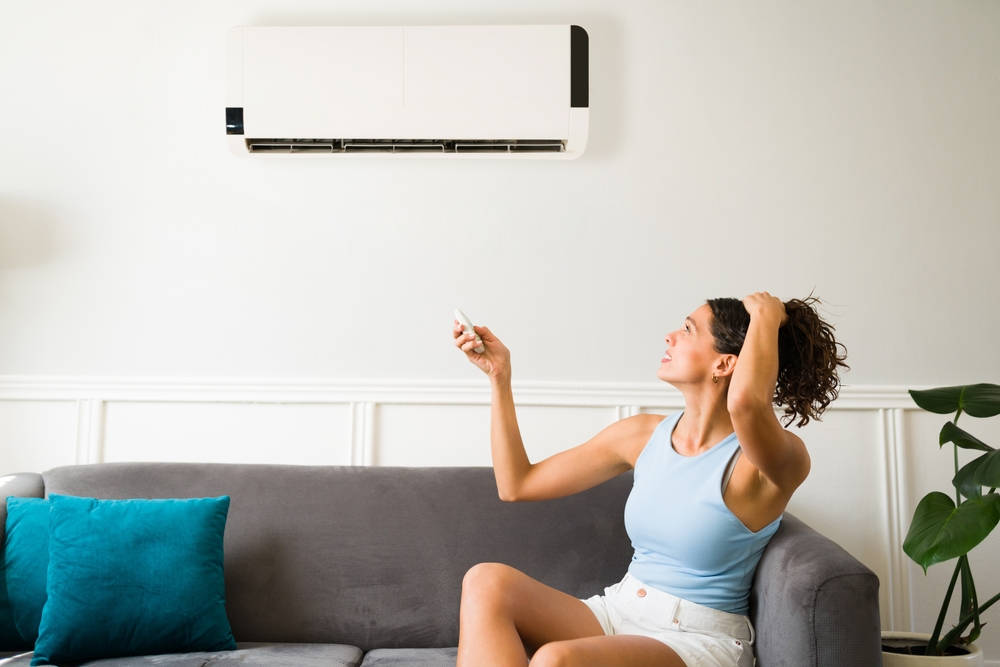When your air conditioner refuses to turn on, you’re left with unbearably hot and muggy conditions, within the comfort of your own home! If you’re tired of feeling like you’re sitting in a pool of sweat, know that a solution is moments away. Our air conditioning experts in Plymouth, MA, are here to explain the most common reasons an AC won’t turn on and how you can address the problem to reclaim your home’s comfort.
Common Reasons an Air Conditioner Won’t Turn On
An air conditioning system is a complex piece of machinery with many interconnected parts, which means there are numerous reasons why it may not turn on one day. While this can sound overwhelming, know that some issues can easily be fixed on your own, while others require the expertise of a trained technician.
Before we go into the troubleshooting steps you can take, let’s look at the top reasons a home AC unit may not power on:
Thermostat Troubles
Your thermostat tells your HVAC system when to cycle on and off. So, if it’s not communicating correctly with the air conditioning unit, the system, of course, will not turn on. The specific problem could be traced back to dead batteries, incorrect settings (e.g., set to “Heat” instead of “Cool”), or a faulty thermostat that needs replacement.
Tripped Circuit Breaker
Your air conditioner requires a significant amount of power to operate, which is why it is connected to its own dedicated circuit breaker. If there’s a power surge or an overload, the breaker will trip to protect the unit, and your home, from damage. When this happens, it cuts off all power to the AC, preventing it from turning on.
Clogged Air Filter
Surprisingly, even a severely clogged air filter can restrict airflow to the point that the system overheats. As a safety measure, many modern AC units will shut down completely to prevent damage to the compressor.
Full Condensate Drain Pan
Your air conditioner removes humidity from the air, which collects as condensation and is drained away. If the condensate drain line becomes clogged, the drain pan will fill with water. Eventually, the system’s float switch will trigger a safety feature that shuts off the unit to prevent water from overflowing and causing damage to your home.
Internal Component Failure
Over time, internal parts like the capacitor, compressor, or blower motor can wear out and fail. A faulty capacitor, for instance, can prevent the motor from starting, while a failed compressor will stop the unit from functioning entirely.
Steps to Take When Your Air Conditioner Won’t Turn On
Before you pick up the phone to call a professional, there are a few troubleshooting steps you can take to potentially resolve the issue.
Of course, always prioritize your safety; if you are uncomfortable performing any of these checks, it’s best to call in an expert.
- Check the Thermostat: Ensure the thermostat is set to “Cool” and the temperature is set at least 5 degrees below the current room temperature. If you have a digital thermostat, check the display. If it’s blank, the batteries likely need to be replaced.
- Inspect the Circuit Breaker: Locate the circuit breaker labeled for your air conditioner (it might be labeled “AC,” “HVAC,” or “Air Handler”). If the switch is in the “Off” position or in the middle, it has tripped. To reset it, push the switch firmly to the “Off” position and then back to the “On” position.
- Change the Air Filter: Open the service panel on your indoor air handler unit and inspect the air filter. If it’s visibly dirty and clogged with dust and debris, replace it with a new one. This clean filter will do double-duty, helping your system run and improving its efficiency and your home’s indoor air quality.
- Check the Condensate Drain Line and Pan: Find the condensate drain pan, usually located under the indoor air handler. If you see standing water in the pan, you likely have a clog. Call a professional HVAC technician to clear this line.
Why You Should Leave AC Repairs to the Professionals
While some tasks like changing filters or checking the thermostat are simple, many AC issues require specialized training, tools, and certification to repair safely. In fact, attempting complex DIY HVAC repairs can be dangerous and may lead to more significant issues. For example, air conditioners operate on high voltage and rely on a chemical refrigerant. Handling any of these components incorrectly can lead to personal injury and compromised health.
Beyond the health and safety risks, do-it-yourself repairs carry the risk of misdiagnoses and improper fixes. This can cause extensive and costly damage to the AC unit. The unauthorized repairs can also void your warranty coverage, leaving you responsible for the full cost of any future breakdowns.
Count on Beantown Home Services to Save the Day
When your air conditioner begins to act up, our AC repair technicians can swoop in and save the day. Our team is equipped to troubleshoot even the most complex AC problems, from electrical faults to mechanical failures, and will deliver cost-effective repairs that get your system back up and running as quickly as possible. Contact Beantown Home Services today in Plymouth, MA, and let us figure out why your air conditioner will not turn on.

